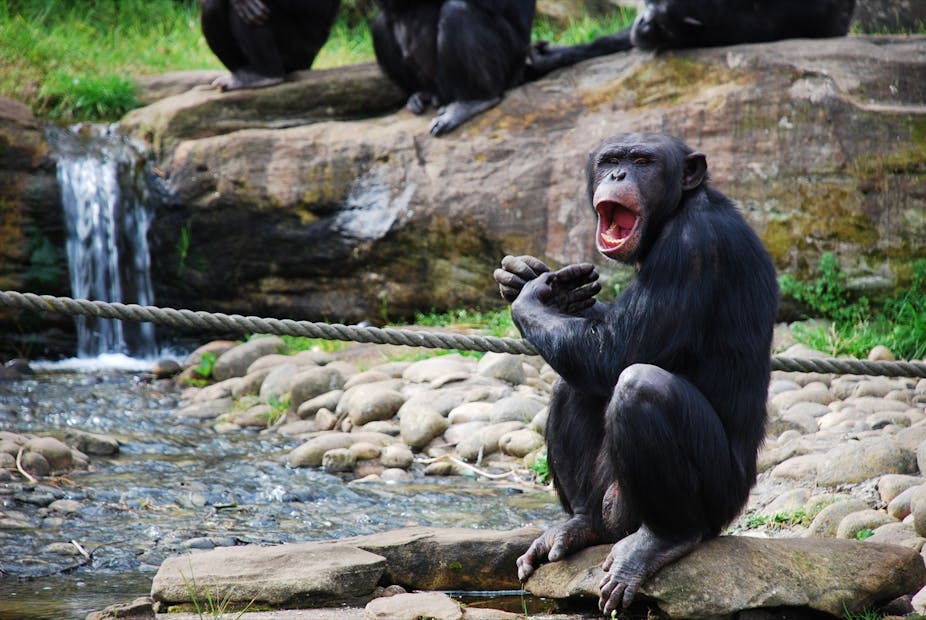Most of us have experienced the overwhelming urge to yawn in response to another person yawning – but we’re not the only species to do this.
Research published in PeerJ today shows bonobos – our closest evolutionary cousins – also experience “yawn contagion”, and, as in humans, the effect is influenced by the quality of relationships shared by individuals.
The tendency for humans to mirror the behaviours and emotions of another – sometimes referred to as “emotional contagion” – is also thought to reflect our heightened capacity for empathy.
This latest research challenges the view that emotional contagion is more pronounced in humans than in other species. It suggests that variation in empathy between humans and bonobos is influenced by the quality of relationships shared by individuals – but experts warn we must be careful to avoid anthropomorphising.
In the first cross-species study of its kind, Elisabetta Palagi, Ivan Norscia and Elisa Demuru from the Natural History Museum at the University of Pisa used levels of “yawn contagion” as a tool for measuring differences in empathy between humans and bonobos over a five-year period.
The ability of an individual to perceive and feel others’ emotions is hard to quantify, which has made measuring empathy in an objective way difficult.
“Empathy is extremely difficult to study,” said Dr Palagi. “The only possibility was to explore the most basal layer of empathy – emotional contagion – and ‘yawn contagion’ is a good candidate to measure emotional contagion.”

In humans and bonobos, the researchers compared levels of “yawn contagion” in weakly-bonded individuals with those occurring in strongly-bonded individuals, revealing important similarities and differences between the two species.
The strength of emotional bonding between individuals was found to be important in stimulating an empathic response only in close friends or kin, with strongly-bonded humans exhibiting a greater level of emotional contagion than strongly-bonded bonobos. A similar level of “yawn contagion” occurred between humans and bonobos in weakly-bonded subjects, reflecting shared empathic foundations between the two species.
“We found that the two species differed in the level and latency of yawn response only when the subjects involved were good friends,” said Dr Palagi. “When the two subjects did not share a particular bonding the two species showed a strong similarity in the frequency of yawn contagion, thus suggesting that both species react in a very similar way to emotional contagion solicitation.”
According to Dr Palagi, monitoring bonobos was a lot easier than monitoring human subjects, as the “yawn contagion” effect is easily disturbed in humans if subjects are conscious of it. Because of this, all people involved in the study were unaware of being observed.
“We calculated how many times each perceived a yawn spontaneously emitted by a another individual and counted how many times he or she responded to that yawn,” she said.
A window into our social past

Mark Elgar, professor of evolutionary biology at the University of Melbourne, said the cross-species approach of the study produced some interesting results.
But he said we should exercise caution in attributing “yawn contagion” to empathic behaviour, since the evolutionary function of yawning behaviour itself remains a mystery.
“My nagging concern is that we don’t really understand why yawn contagion exists, especially since it can be triggered by at least two ‘emotive’ states – boredom and embarrassment – and one physiological state – tiredness,” Professor Elgar said. “What is the evolutionary significance of yawning?”
Darren Curnoe, associate professor in human evolution from the University of New South Wales, said the research helps us to better understand the “gap” between humans and other species – what it is that makes us unique.
“This fascinating research demonstrates at once how similar, and yet, how different we are to our chimpanzee and bonobo cousins,” he said.
He said the study also sheds light on the origin of human social behaviour.
“The desire to yawn, when we see it in others, is a reflection of our emotional connection to them and our brain sharing what they do,” he said. “It’s a result of our strong empathy with people whom we share strong bonds, we can’t help but imitate them. It has a very deep evolutionary origin back to our ape ancestors from millions of years ago.
"What’s unique though about our human form of emotional empathy is its intensity – we show a deeper form of empathy and bonding than chimpanzees or bonobos do. This is something that changed during our evolution and must reflect a difference in the way our ancestors behaved and organised themselves socially compared to chimps and bonobos.”

